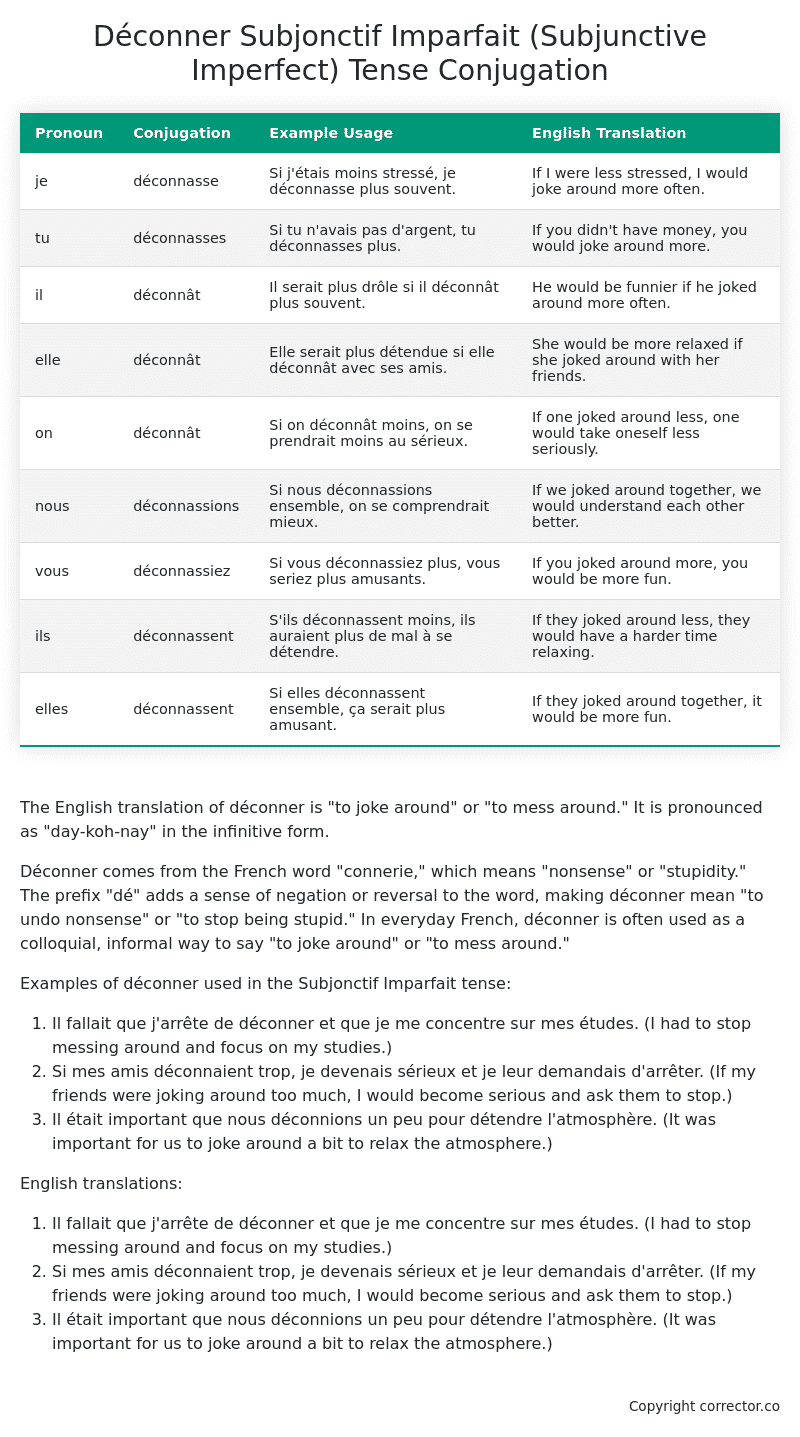Subjonctif Imparfait (Subjunctive Imperfect) Tense Conjugation of the French Verb déconner
Introduction to the verb déconner
The English translation of déconner is “to joke around” or “to mess around.” It is pronounced as “day-koh-nay” in the infinitive form.
Déconner comes from the French word “connerie,” which means “nonsense” or “stupidity.” The prefix “dé” adds a sense of negation or reversal to the word, making déconner mean “to undo nonsense” or “to stop being stupid.” In everyday French, déconner is often used as a colloquial, informal way to say “to joke around” or “to mess around.”
Examples of déconner used in the Subjonctif Imparfait tense:
- Il fallait que j’arrête de déconner et que je me concentre sur mes études. (I had to stop messing around and focus on my studies.)
- Si mes amis déconnaient trop, je devenais sérieux et je leur demandais d’arrêter. (If my friends were joking around too much, I would become serious and ask them to stop.)
- Il était important que nous déconnions un peu pour détendre l’atmosphère. (It was important for us to joke around a bit to relax the atmosphere.)
English translations:
- Il fallait que j’arrête de déconner et que je me concentre sur mes études. (I had to stop messing around and focus on my studies.)
- Si mes amis déconnaient trop, je devenais sérieux et je leur demandais d’arrêter. (If my friends were joking around too much, I would become serious and ask them to stop.)
- Il était important que nous déconnions un peu pour détendre l’atmosphère. (It was important for us to joke around a bit to relax the atmosphere.)
Table of the Subjonctif Imparfait (Subjunctive Imperfect) Tense Conjugation of déconner
| Pronoun | Conjugation | Example Usage | English Translation |
|---|---|---|---|
| je | déconnasse | Si j’étais moins stressé, je déconnasse plus souvent. | If I were less stressed, I would joke around more often. |
| tu | déconnasses | Si tu n’avais pas d’argent, tu déconnasses plus. | If you didn’t have money, you would joke around more. |
| il | déconnât | Il serait plus drôle si il déconnât plus souvent. | He would be funnier if he joked around more often. |
| elle | déconnât | Elle serait plus détendue si elle déconnât avec ses amis. | She would be more relaxed if she joked around with her friends. |
| on | déconnât | Si on déconnât moins, on se prendrait moins au sérieux. | If one joked around less, one would take oneself less seriously. |
| nous | déconnassions | Si nous déconnassions ensemble, on se comprendrait mieux. | If we joked around together, we would understand each other better. |
| vous | déconnassiez | Si vous déconnassiez plus, vous seriez plus amusants. | If you joked around more, you would be more fun. |
| ils | déconnassent | S’ils déconnassent moins, ils auraient plus de mal à se détendre. | If they joked around less, they would have a harder time relaxing. |
| elles | déconnassent | Si elles déconnassent ensemble, ça serait plus amusant. | If they joked around together, it would be more fun. |
Other Conjugations for Déconner.
Le Present (Present Tense) Conjugation of the French Verb déconner
Imparfait (Imperfect) Tense Conjugation of the French Verb déconner
Passé Simple (Simple Past) Tense Conjugation of the French Verb déconner
Passé Composé (Present Perfect) Tense Conjugation of the French Verb déconner
Futur Simple (Simple Future) Tense Conjugation of the French Verb déconner
Futur Proche (Near Future) Tense Conjugation of the French Verb déconner
Plus-que-parfait (Pluperfect) Tense Conjugation of the French Verb déconner
Passé Antérieur (Past Anterior) Tense Conjugation of the French Verb déconner
Futur Antérieur (Future Anterior) Tense Conjugation of the French Verb déconner
Subjonctif Présent (Subjunctive Present) Tense Conjugation of the French Verb déconner
Subjonctif Passé (Subjunctive Past) Tense Conjugation of the French Verb déconner
Subjonctif Imparfait (Subjunctive Imperfect) Tense Conjugation of the French Verb déconner (this article)
Subjonctif Plus-que-parfait (Subjunctive Pluperfect) Tense Conjugation of the French Verb déconner
Conditionnel Présent (Conditional Present) Tense Conjugation of the French Verb déconner
Conditionnel Passé (Conditional Past) Tense Conjugation of the French Verb déconner
L’impératif Présent (Imperative Present) Tense Conjugation of the French Verb déconner
L’infinitif Présent (Infinitive Present) Tense Conjugation of the French Verb déconner
Struggling with French verbs or the language in general? Why not use our free French Grammar Checker – no registration required!
Get a FREE Download Study Sheet of this Conjugation 🔥
Simply right click the image below, click “save image” and get your free reference for the déconner Subjonctif Imparfait tense conjugation!

Déconner – About the French Subjonctif Imparfait (Subjunctive Imperfect) Tense
Formation
Common Everyday Usage Patterns
Interactions with Other Tenses
Subjonctif Présent
Indicatif Passé Composé
Conditional
Conditional Perfect
Summary
I hope you enjoyed this article on the verb déconner. Still in a learning mood? Check out another TOTALLY random French verb conjugation!


